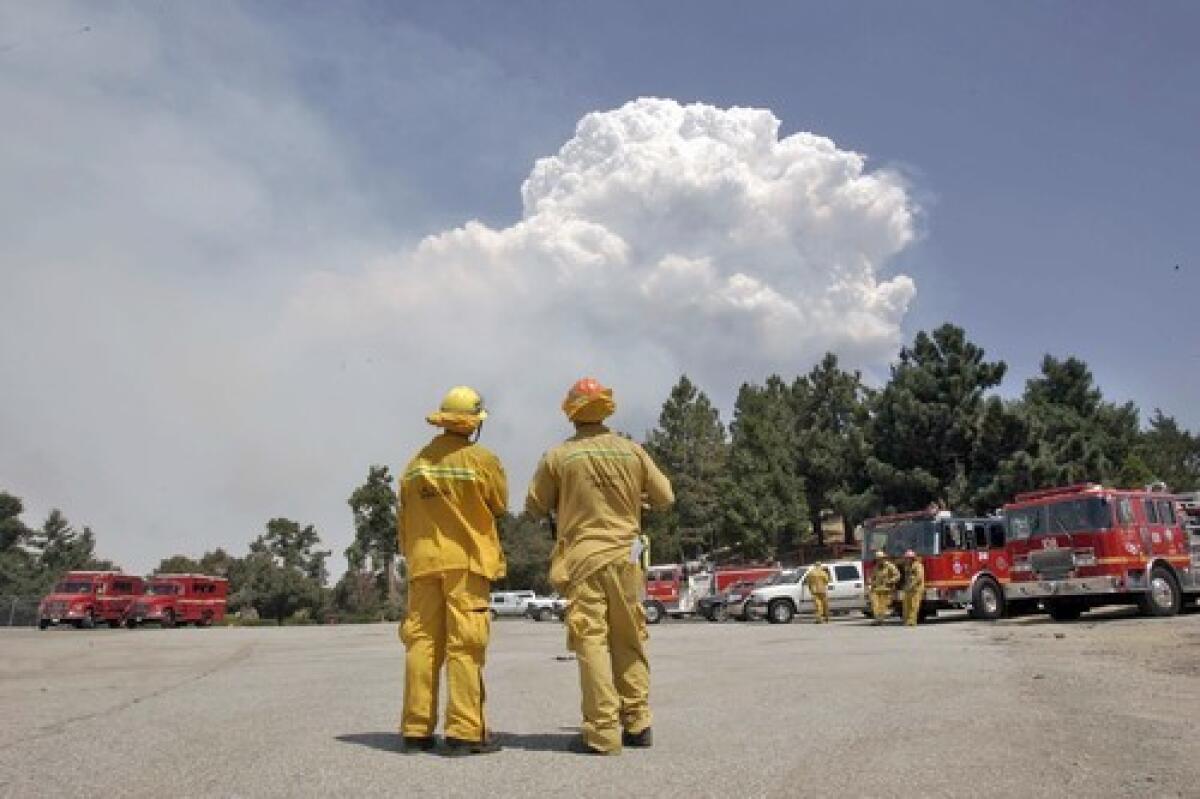State help for firefighters ‘a heavy lift’

- Share via
From Sacramento — You’d think that with half the state charred -- and wildfires seemingly getting worse every year -- a top priority in Sacramento would be to improve California’s firefighting capability. But it hasn’t even been on the Legislature’s agenda.
Gov. Arnold Schwarzenegger, responding to the lobbying efforts of fire officials around the state, tried to hoist the topic back onto the negotiating table Wednesday. But “it’s a heavy lift,” acknowledged his spokesman, Matt David.
The Legislature is frantically rushing toward a Friday adjournment of its regular session, already juggling some hot issues and not anxious to add another. Besides, it’s not exactly in the mood to do the governor any favors.
Only 24 hours before Schwarzenegger’s renewed pitch for firefighting improvements, he tried to strong-arm the Legislature into passing comprehensive water, prison, renewable energy and economic stimulus bills by promising to veto all other measures until they complied. He didn’t mention anything about firefighting. The whole exercise of power didn’t sit well with the Democratic majority.
On Wednesday, a delegation of roughly 40 fire officials descended on the Capitol to pitch for more money and better equipment. The governor heard about it and quickly called a photo-op to promote their cause.
Democrats and Republicans alike, Schwarzenegger asserted, should “put aside their ideology and think about what’s important for the state.”
Schwarzenegger originally proposed major improvements in firefighting and emergency preparedness -- not just for wildfires, but earthquakes, floods, potential terrorist attacks -- as part of this year’s state budget.
He wanted to place a 4.8% surcharge on property insurance policies -- residential and commercial -- and raise $480 million annually in the first full fiscal year, starting July 2010. Roughly one-third of the money, $150 million, would go directly to local fire departments. Another $150 million would be set aside for all types of emergencies.
The rest would be used to begin updating the old helicopter fleet. The state currently uses 11 Vietnam-era choppers that can’t fight fires at night or fly over large bodies of water. It also would buy 131 modern fire engines and assign them to local departments on condition they be made available when big wildfires erupt. Extra crew members would be hired. And the state would begin planning to stash emergency supplies such as cots, water and blankets in potential disaster zones.
Schwarzenegger asserted it would cost the average policyholder “$4 a month. That’s all we’re talking about. . . . So this is a little amount of money that can really save a lot of lives and get us a lot of equipment and resources for fighting those fires and other emergencies.”
But you can see the political problem. Republicans view this “fire fee” as a tax increase. So does the Legislature’s lawyer. That means it would require a two-thirds majority vote.
Even with the Republicans’ small minority -- which got even smaller Wednesday with the sudden resignation of Assemblyman Michael Duvall of Yorba Linda in a sex scandal -- they have the ability to block a tax hike. And the modern GOP considers practically any tax hike unthinkable.
Given that reality, Democrats didn’t figure that the fire tax was worth fighting for during the July budget brawl. Besides, they thought, any new revenue should be used to staunch the badly bleeding budget, not to enhance programs.
But that was long before the still-burning Station fire in Los Angeles County, already the 10th-largest California wildfire ever recorded, dating back to 1932.
In fact, seven of the 10 biggest wildfires have occurred in this decade, topped by the 2003 Cedar fire in San Diego County.
“People used to ask what my biggest concern was,” says Del Walters, the state’s fire chief. “I said the budget. But the more I look at climate change, that’s the single biggest issue. It drives everything else. The reason for climate change is arguable. But the fact that something is going on is not.
“It means longer periods in which we have to keep engines and staffs in play. Off-season fires seem to be happening more frequently. . . . We had several fires in Humboldt County in January.”
Meanwhile, the state has raided local government coffers and used roughly $4 billion to balance its budget. City and county fire departments are strapped.
This endangers the core strategy of fighting California wildfires: a mutual aid system that long has relied on far-flung departments coming to the rescue of counties ablaze. The system already is starting to unravel: San Francisco turned down the state’s request for major help during the L.A. fire. It couldn’t risk sending backup engines out of town.
“We were able to meet all of the resource requests for the Station fire,” Sheldon Gilbert, president of the California Fire Chiefs Assn., told Schwarzenegger. “But what happens when we get two or three others going and they’re wind-driven?”
Gilbert, the Alameda County fire chief, added: “We’re simply telling the legislators two things: ‘If not now, when? None of us have any plausible deniability anymore. We all know what’s coming. . . . ‘
“And then, ‘If not this, what?’ And so far we haven’t received any alternatives that are going to be realistic.”
But the Capitol lobbying effort was frustrating for the fire officials, according to Carroll Wills, spokesman for the California Professional Firefighters union. “They kept getting ‘Nos.’ It was like, ‘You guys are great. We love firefighters, but. . . . “
Firefighting is about public safety, which most politicians claim is their top priority. You’d think they could address it -- along with water, prisons, energy and a bunch of trivia -- even while distracted by a colleague’s sex scandal.
More to Read
Sign up for Essential California
The most important California stories and recommendations in your inbox every morning.
You may occasionally receive promotional content from the Los Angeles Times.














